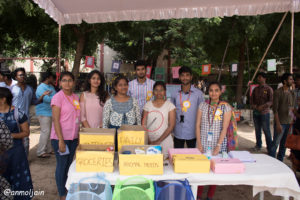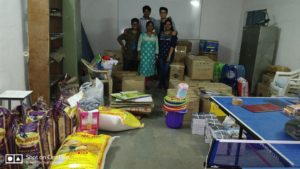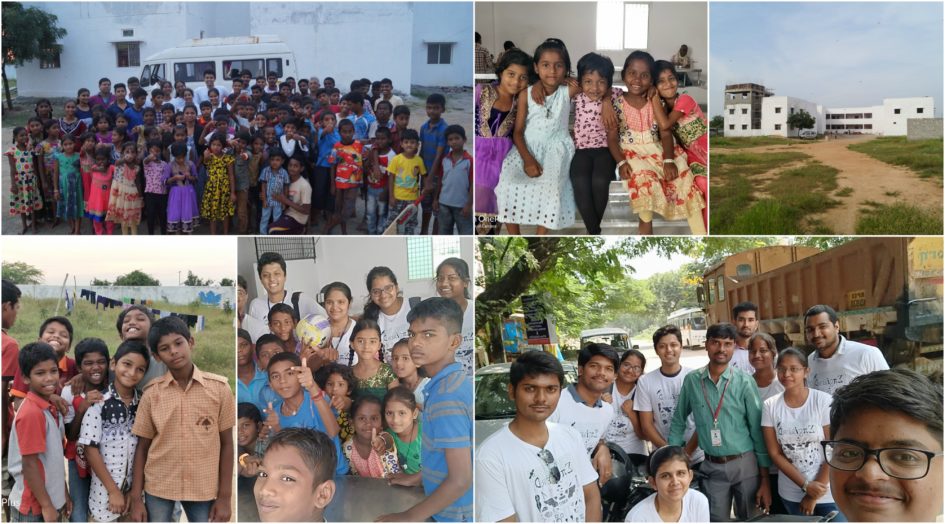On 13th October, KMIT celebrated its 10th anniversary with a day-long fest on our beautiful green campus. Even as it evolves, KMIT’s purpose remains the same: to nurture talent and foster initiative among the youth of today. As KMIT marked 10 years, it encouraged students to make social contributions (or charity as we like to call it) leading up to the Diwas.
This article is dedicated to each one of you, staff member or student, who came forward in small but important ways to help a good cause. This article also wants to celebrate the efforts of the students responsible for streamlining the operations of this initiative: from setting camp in the scorching heat for collection of donated clothes and items to spending time at the orphanage and old-age home, they were dedicated to the cause and proved worthy of the trust placed in them.
Through this article, we also want to make sure that we stay accountable to you and show you the smiles you brought on strangers’ faces with your generosity.
We searched for and identified three charity organisations – an orphanage, an old age home and an animal welfare organisation, along with an organ donation pledge campaign, powered by JeevanDan, NIMS.
We set up a little counter outside the canteen from the 9th to the 12th, where we accepted, apart from monetary donations, clothes, groceries, stationery, daily needs and cat needs.
We’re proud to say that we’ve been able to collect 200 organ donation pledges and 68,000 rupees in cash, which was rounded off to one lakh rupees by the management.




Orphanage visit:
We raised a total of 33,000 Rupees and collected 30 cartons of clothing items for the orphanage run by Spoorthi Foundation located in the Dundigal village. A breakdown of how the money was spent:
9,000 – Stationary items
14,000 – Grocery items
10,000 – Grooming and sanitation items.

The orphanage houses 150 children between the ages of 6-15 and is run by a father-son pair. They also run a home for older children studying in intermediate and undergraduate courses, in Charlapalli. The experience at the Orphanage was delightful, with a huge crowd of children greeting us with hugs and handshakes. All of them were extremely excited to give us a tour of the place and took great interest in showing us the possessions they held in dearness. They also had a computer lab and a mini-library (for future reference: please donate books including novels to orphanages). We played games with them in their backyards and danced and sang with them in enthusiastic unison. It was a wonderful experience and most of us hope to visit them again!




Old-Age Home visit:
We raised a total of 36,000 Rupees and here’s the breakdown of how the money was spent:
10,000 – Plastic chairs
5,000 – Plastic stools
10,000 – Grocery items
3,000 – Hand Towels
13,000 – donated in cash to buy airbeds etc.

 The visit to the old-age home reminds me of society’s embarrassment with the frailty of old age. As youngsters, it is especially easy to use and abuse our bodies because evolutionary advantages have equipped them to heal and repair by themselves – tricking us and making us extremely unsympathetic to the old. Death and old-age are an eventuality, and yet we live in absolute denial of these facts of life. The visit to the old-age home wasn’t happy but it was enlightening – caution: visits to such places are often turned into narratives about the larger truths of life and death but that isn’t my intention. This visit is about the older sections of our society and how we, as a collective, treat them, and I only allude to mortality as an argument to evoke empathy. Most people who are old become incapable of bathing themselves, cleaning after themselves and eating, as well as talking or moving without considerable struggle. In a way, they demand the same care that children do and yet we consider it disgusting to help them. It’s not my place to say whether you should do this without shame or not. However, what I did realize from speaking to many of the people at the old age home was that what we most lack in doing for them is to give them our time and attention. From old men and women who’re still mentally sharp to those who’ve lost much of their grasp of reality, they all long for time, affection and empathy. That, I think, is a better lesson learnt in humility than ruminations about grander themes of life.
The visit to the old-age home reminds me of society’s embarrassment with the frailty of old age. As youngsters, it is especially easy to use and abuse our bodies because evolutionary advantages have equipped them to heal and repair by themselves – tricking us and making us extremely unsympathetic to the old. Death and old-age are an eventuality, and yet we live in absolute denial of these facts of life. The visit to the old-age home wasn’t happy but it was enlightening – caution: visits to such places are often turned into narratives about the larger truths of life and death but that isn’t my intention. This visit is about the older sections of our society and how we, as a collective, treat them, and I only allude to mortality as an argument to evoke empathy. Most people who are old become incapable of bathing themselves, cleaning after themselves and eating, as well as talking or moving without considerable struggle. In a way, they demand the same care that children do and yet we consider it disgusting to help them. It’s not my place to say whether you should do this without shame or not. However, what I did realize from speaking to many of the people at the old age home was that what we most lack in doing for them is to give them our time and attention. From old men and women who’re still mentally sharp to those who’ve lost much of their grasp of reality, they all long for time, affection and empathy. That, I think, is a better lesson learnt in humility than ruminations about grander themes of life.



Leave a Reply